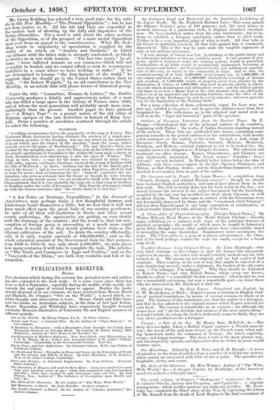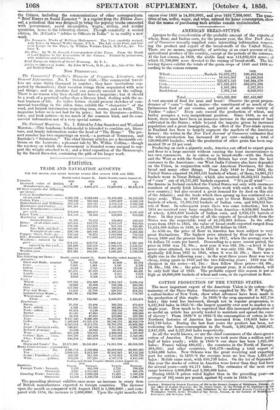PUBLICATIONS RECEIVED.
Boons.
TEE slackness which during this autumn has pervaded news and politics has also extended to the book trade. It is some years since there has been so dull a September, especially during the middle of the month, for towards the end signs of revival began to appear. Besides the books already disposed of in our columns, we have received from Messrs. Hurst and Blackett, Dr. Owgan's "Out on the World " ; a novel which ex- hibits thought and observation at least. Messrs. Smith and Elder have sent two books on Australian subjects, in the form of fact and fiction. Messrs. Macmillan and Whittaker have respectively brought forward scholastic Memoirs illustrative of University life and English manners at different periods.
Out on the World. By Henry Owgan, LL.D. In three volumes.
Tender and True : a Colonial Tale. By the Author of "Clara Morison." In two volumes.
A Residence in Tasmania: with a Descriptive Tour through the Island, from Macquarie Harbour to Circular Head. By Captain H. Butler Stoney, 99th Regiment ; Author of" Five Years in the Levant," fk.c.
Autobiography of Matthew Robinson. Now first edited, with Illustrations, by J. E. B. Mayor, M.A., Fellow and Assistant-Tutor of St. John's College, Cambridge. (Cambridge in the Seventeenth Century. Part II.) Early Years and late Reflections. By Clement Canyon, 31.D., late Fellow of Pembroke College. On Truth and Error : Thoughts in Prose and Verse, on the Principles of Troth and the Causes and Effects of Error. By John Hamilton, of St. Ernan's. M.A. of St. John's College, Cambridge. Stars and Stripes; or American Impressions. By Ivan Golovin. (Transat- lantic Library.) The Duration of Human Life and its three Eras : when men attained to more than nine hundred years of age ; when they attained to only four hundred and fifty ; when they reached to only threescore years and ten. By Joel Pinney, Esq., Author of "The Influence of Occupation upon Health and Life," &e.
The Hills of the Shatemue. By the Author of "The Wide, Wide World." Old Memories: a Novel. By Julia Melville. In three volumes. The Double Coronet: a Novel. By the Author of "Charles Aucheeter," 8c.c. In two volumes. An Argument Legal and Historical for the Legislative Prohibition of the Liquor Trap. By Dr. Frederick Richard Lees.—This essay gained the Alliance Society's prize of 100 guineas ; and, like most prizes in avowed advocacy of a particular view, it displays abundant onesided- ness. Dr. Lees doubtless writes from his own convictions; but he la- bours to establish a foregone conclusion, rather than to elicit truth. Neither is he a very impartial judge of what is truth. All that tells in his favour is implicitly received, all that tells against him is summarily disposed of. This is the way he puts aside the tangible argument of nine or ten millions of revenue.
"A vast amount of labour now lost, in drinking at the public-house and in subsequent indolence or disease, would be saved. A vast amount of pro- perty, spoilt or destroyed under the existing system, would be preserved. Commodities of all kinds would be prodigiously augmented, becoming at once cheaper and better ; and Government would save millions of expendi- ture in this way, as surely as the community at large. Add to this, the eventual saving of at least 5,000,000/. of our pauper tax, of 1,000,0001. of our county and local rates, of 1,000,000/. through the lessening of disease and accident, of 1,000,000/. worth of property saved from plunder by the diminution of crimes, of 1,000,0001. dispensed in private charity to allevi- ate evils which drunkenness and debauchery create ; and the dullest patriot will begin to see how a Maine Law is the only measure that can effectually relieve us of an oppressive and increasing taxation, make the office of the Chancellor of the Exchequer by and by a very easy one, and even open the way for the liquidation of the National Debt.'
For a large collection of facts, vehemently urged, Dr. Lees was, we dare say, entitled to his prize ; and he gave the Alliance more than they bargained for. His collectanea go to the physical and moral evils as well as to the "legal and historical" parts of the question.
Outlines of European Literature from the Earliest Times. By F. Thorpe.—Chronological lists of the principal authors of all countries, beginning with Pindar ; the works of Indian literature standing instead of the writers. These lists are subdivided into classes, containing some general remarks on the period embraced in the subdivisions, with mostly a few sentences on the author, or the work. In such a wide range of literature—Greek, Roman, Patristic, Oriental, Hebraic, Mediaeval, Northern, and Modern—original judgment is not to be looked for; the compiler avows his obligation to Schlegel's Lectures. The selection and treatment are often strange. Homer, Demosthenes, and Chaucer, are only incidentally mentioned. The Greek orators ! Catullus ! Livy ! Juvenal ! are not included. In English belles lettres before the time of Addison, only three names appear in the list—Spenser, Shakspere, and Milton ; so that Dryden, Butler, and the Elizabethan dramatists, not to mention lesser names, form no part of the outline.
The Caucasus and its People. By Louis Moser.—A compilation from "French, German, and original Russian sources " ; though we should have included English authorities, and indeed have placed them in the first rank. The task is neatly done, but the book is late in the day ; not merely because the interest in the subject has passed, but the knowledge acquired by the late war has modified our ideas about Circassia as well as about Russia. Those who came in contact with the Circassians were not favourably impressed by them, and the "renowned chief Schamyl" did not show himself equal to any large conception or combination, or indeed trouble himself to take advantage of the time.
A Class-Atlas of Physical-Geography. [Gleig's School Series.] By Walter M`Leod, Head Master of the Model School, Chelsea.—Twenty maps, exhibiting on a reduced scale some of the principal features of physical geography ; the model of which must be sought in Johnston's great Atlas, though various other publications have successfully aimed at presenting the same knowledge. Explanatory notes accompany the maps. The Class-Atlas is a gem of neatness and prettiness : the 18mo. size of the book perhaps renders the scale too small, except for a broad coup d'ceil.
Troubled Beams: being Original Poems. By John Hartleigh.—Our very brief criticism on this volume is, that the former title adequately expresses its merits ; the latter title would certainly mislead any one who trusted to it. The poems are not original, and are bad copies of bad originals. They express, in the sort of way that might be expected of a man slumbering uneasily under a nightmare, the burden of the old comic song, "I'm unhappy, I'm unhappy." Why they should be dedicated to Robert Burns—and why Robert Burns, whom every one knows, should be called "a remarkable Scotch exciseman," when in fact he was not a remarkable exciseman, but was a remarkable poet—we leave those who are interested in Mr. Hartleigh to find out.
The Frithjof Saga. By _Sales Tegner. Translated into English, by C. W. Heekethorn, of Basle.—Tegner's poem is familiar to English read- ers of poetical translations, by means of several versions in whole or in part. poetical
features of this translation are, that the author is a foreigner, and that he has adhered to the original metres which Tegner selected for each book. The version is remarkable as an exercise ; for although the verses have not " all the freedom and raciness of the most native idiom," as Lord Carlisle (to whom the book is dedicated) seems to think, they are very clever productions for a foreigner.
Vernon : a Tale of the Sea. By Henry Bate, M.R.C.S., &c.—The story of a sea-fight, where a British frigate captures a French man-of- war ; the wreck of the said man-of-war on the French coast, when sail- ing homeward under the command of Vernon ; the hero's captivity, escape, and happy marriage. The story is told in the most prosaic way, and interrupted by episodes and digressions that no writer in prose would venture upon.
Our Miscellany. Edited by E. H. Yates and R. B. Brough.—A series of parodies, in the form of articles from a number of well-known writers, whose names are travestied with little of art or point. The parodies are laughable, clever, and coarse.
The Hills of the Shatemuc. By Miss Warner, Author of "The Wide, Wide World," &c.—A cheaper reprint, by Routledge, of the American novel we noticed a fortnight since.
The tenth volume of Singer's " Shalcspeare " terminates the work : it contains Othello, Antony and Cleopatra, and Cymbeline ; a sin lar arrangement, which neither purpose nor authority justifies. Mr.Rout- ledge has completed the Times' story of the War, by reprinting the letters of Mr. Russell from the death of Lord Raglan to the final evacuation of
the Crimea, including the commwdeations of other correspondents. " BrielEssays On Social Economy" is a reprint from the Elthant Tour. nal, a periodical that was designed to bring the popular truths connected with government, social inequalities, wages,, strikes and similar questions, home to the labouring Classes. Though nominally a second edition, Dr. M'Cosh's "Advice to Officers in India" is in reality anew. Work.
The Dramatic Works of William Shakespeare. The Text carefttlly revised, with Notes, by: Samuel Weller Singer, F.S.A. The Life of the Poet, and CA.
tical Essays on the Plays, by William Watkins Lloyd, &c. Vu.' lame X.
The War. By W.. 11. Russell, Correspondent of the Times. From the Death of Lord Raglan to the Evacuation of the Ciiinea. Printed by permission, with Additions and Corrections.
Brief Essays on Subjects of Social Economy. By T. L. Adrice to Officers in India. By John 5PCosh, M.D., &c. &c., late of the Ben- gal Medical Staff.
NEW PERIODICALS.
The Commerciel Traveller's Magazine of Commerce, Literature, and General Information. No. I. October 1856.-The commercial travel- lers are some thirty thousand in number ; they have institutions sup- ported by themselves ; their vocation brings them acquainted with men and things ; and an absolute fool can scarcely succeed in the calling. There is no reason why they should not have a magazine ; but it should be a work of a practical rather than a literary kind, dealing with the ac- tual business of life. Its belles lettres should present sketches of com- mercial travelling in the olden time exhibit the "characters" of the road, and furnish information respecting inns, routes, and so forth. The magazine before us is not bad for its price ; but its literature-politics, tales, and book notices-is too much of the common End, and its com- mercial information not of a very special nature.
The National Magazine. No. I. Edited by John Saunders and Westland Marston.-This handsome hebdomadal is intended to combine art, litera- ture, and family information under the head of "The Home." The pre- sent number has two engravings on wood,-a portrait of Tennyson, and Eastlake's "Salutation." The chief literary articles are a favourable cri- ticism on the Laureate ; a pleasant tale by Mr. Wilkie Collins,- though the mystery on which the denouement is founded seems unequal to sup- port the weight attached to it; and a brief exposition of the Stereoscope, by Sir David Brewster, containing the pith of his larger work.



































 Previous page
Previous page